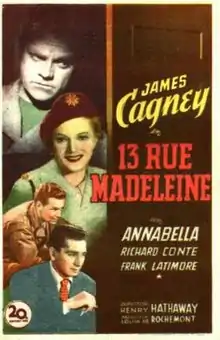13 Rue Madeleine
13 Rue Madeleine is a 1947 World War II spy film directed by Henry Hathaway and starring James Cagney, Annabella, and Richard Conte. The title refers to an address in Le Havre where a Gestapo headquarters was located.
| 13 Rue Madeleine | |
|---|---|
 Film poster | |
| Directed by | Henry Hathaway |
| Produced by | Louis De Rochemont |
| Written by | John Monks, Jr. Sy Bartlett |
| Starring | James Cagney Annabella Richard Conte |
| Narrated by | Reed Hadley |
| Music by | David Buttolph |
| Cinematography | Norbert Brodine |
| Edited by | Harmon Jones |
| Distributed by | Twentieth Century-Fox Film Corporation |
Release date |
|
Running time | 95 minutes |
| Country | United States |
| Language | English |
| Box office | $2,750,000 (US rentals)[1] |
Plot
Bob Sharkey (Cagney), an instructor with a group of American espionage candidates, teaches his students the art of enemy infiltration. However, he is alerted that one of the students is a Nazi-German agent named "Bill O'Connell" (Conte). Sharkey's boss, Charles Gibson (Walter Abel), confirms that O'Connell is actually Wilhelm Kuncel, one of Germany's top spies, but tells Sharkey to pass him through the course, as they know Kuncel's mission is to determine the date and location of Operation Overlord (the planned Allied invasion of Europe). They intend to provide Kuncel with false information to pass along to his superiors.
At the end of their training, three of the new agents—Frenchwoman Suzanne de Beaumont (Annabella), American Jeff Lassiter (Frank Latimore), and Kuncel—are sent to Great Britain. From there, they prepare to embark on a mission into German-occupied France. Kuncel is briefed on a fictitious invasion of Europe through Holland, but at the last minute, he asks Gibson to send Lassiter with him. Lassiter has been briefed on a different mission—to locate the factory depot for V-2 rockets that will be used against the Allied invasion ports, with Suzanne as his radio operator. Sharkey tells Lassiter about Kuncel and assigns him to accompany Kuncel into Holland, but then to continue on his own mission. If Kuncel tries to follow Lassiter instead of completing his own mission, Lassiter is to kill him. However, Lassiter's uneasiness apparently alerts Kuncel. When the trio parachutes into Holland, Lassiter's parachute fails to open, and he plummets to his death. The jumpmaster (Karl Malden) of the B-24 Liberator transporting the group discovers that the strap to Lassiter's static line was deliberately cut. Gibson and Sharkey realize that Kuncel knows that the information he was given is false and that he can identify every agent with whom he trained.
With no time to brief another agent to act in Lassiter's stead, Sharkey parachutes into France. With the help of the local French resistance led by the town's mayor (Sam Jaffe) and his driver (E. G. Marshall), Sharkey completes his mission, apprehending the collaborator who designed the V-2 depot and returning him to Great Britain. However, while intercepting Kuncel as he tries to stop the pickup airplane from taking off, Sharkey is captured. Suzanne is killed while transmitting the news to England. The Gestapo torture Sharkey, but he refuses to reveal his knowledge. Back in Great Britain, Gibson has no choice but to order a bombing raid to destroy the Gestapo headquarters and kill Sharkey before he cracks. As the bombs strike, Sharkey and Kuncel both perish.
Cast
- James Cagney as Robert Emmett 'Bob' Sharkey
- Richard Conte as Wilhelm Kuncel / William H. 'Bill' O'Connell
- Annabella as Suzanne de Beaumont
- Frank Latimore as Jeff Lassiter
- Walter Abel as Charles Gibson
- Melville Cooper as Pappy Simpson
- Sam Jaffe as Mayor Galimard
- Karl Malden as B-24 Jumpmaster
- E. G. Marshall as Emile
- Trevor Bardette as Resistance fighter
- Red Buttons as Second Jump Master (uncredited)
- Arno Frey as German Officer
- Donald Randolph as La Roche
- Roland Winters as Van Duyval
- Blanche Yurka as Madame Thillot
Production
Prohibited from mentioning the OSS during the war due to secrecy, several Hollywood studios made their own films about the agency after the war, such as Paramount's O.S.S., Warner Bros./United States Pictures Cloak and Dagger, and RKO's Notorious directed by Alfred Hitchcock. Though 13 Rue Madeleine was originally written to showcase the O.S.S., with Cagney playing a character based on William Donovan and featuring Peter Ortiz as a technical advisor, Donovan raised major objections to the film, including the idea that his agency had been infiltrated by an enemy agent.[2] The spy group was renamed "O77" and Cagney's character had no similarities to Donovan.
The film followed Fox's The House on 92nd Street, a true story of Federal Bureau of Investigation counter espionage, which shared the same director, producer, and one of the writers.
Much of the filming was done in Quebec City, Quebec, Canada. The scene where Sharkey is leaving the "local French HQ", on his way to meet with the local resistance was shot on rue Donnacona, with the Ursulines School in the background.
The Breen Office objected to the Americans bombing a building solely to kill Sharkey. But Sy Bartlett, one of the film's scriptwriters, had been in the Army Air Corps during World War II and such an incident did take place, though in a different context. According to Henry Hathaway, the film's director, that actual occurrence was the basis for the film's final scene.[2]
References
- "Top Grossers of 1947", Variety, 7 January 1948 p 63
- p.120 Dick, Bernard F. The Star Spangled Screen University of Kentucky Press